 The Institute of Museum and Library Services (IMLS) announced on May 21 its plans to participate in the first National Day of Civic Hacking on June 1 and 2.
The Institute of Museum and Library Services (IMLS) announced on May 21 its plans to participate in the first National Day of Civic Hacking on June 1 and 2.
Described as a “public-private-people partnership,” the event is being further described as “the largest ever to bring together citizens from around the country to work with local, state, and federal governments—as well as private sector organizations—with the common goal of improving their community through technology,” according to the IMLS announcement.
The announcement notes that tech-savvy citizens and entrepreneurs have developed many apps that utilize publicly released government data to a variety of ends, such as helping people report potholes to their local streets department, helping people communicate with local food shelters to identify shortage and excess in different neighborhoods to facilitate redistribution, or simply helping people catch a bus or train on time.
IMLS will present participants with two challenges. A public library challenge will encourage programmers to build tools that help users explore data from IMLS’s annual public library data collection efforts in new ways, and a museum data challenge encourages participants to develop tools that could enrich IMLS national museum data collection efforts using administrative data from the Museums Count survey. More information is available at the hackforchange.org website.
“Libraries and museums are centers for civic engagement in communities across the country,” IMLS Director Susan Hildreth said in the announcement. “We encourage them to join us in this first ever National Day of Civic Hacking by hosting events and by using their own in-house expertise to rise to the challenge with new civic hacks that address community needs. We can’t wait to see what kind of useful tools the nation’s online citizenry can create with IMLS data.”
National Day of Civic Hacking is backed by the White House through the Office of Science and Technology Policy (OSTP), and currently 20 federal agencies are participating. To date, events have been registered in more than 80 cities in 32 states, as well as the District of Columbia and Puerto Rico.


